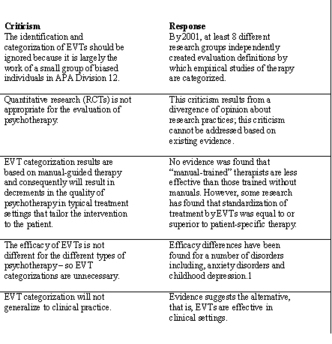As the number of clinical interventions for pathological gambling grows, so does the need for proper evaluation of treatment effectiveness. Many researchers advocate the practice of evidence-based psychotherapy (Chambless & Ollendick, 2001). However, it might surprise readers to learn that a debate exists within the clinical and research community as to whether using evidence-based methods is an appropriate goal for practicing clinicians. This WAGER reports on a review by Chambless and Ollendick (2001), that summarized evidence, criticisms, and responses pertaining to the classification of empirically validated treatments and the dissemination of such classifications. The WAGER focuses on common criticisms of schemes to classify experimental efficacy studies and the responses to these criticisms.
Empirically validated treatments (EVTs) are therapeutic approaches that have been experimentally tested for efficacy. Chambless and Ollendick (2001) suggested that proponents of the classification of experimental tests commonly group them into three categories: (1) well-established (e.g., “at least two rigorous randomized controlled trials (RCTs) showing superiority over placebo control”), (2) probably efficacious (e.g., “at least one RCT in which the treatment proved superior to the control condition”), and (3) promising (e.g. “low level of evidence”). Groupings are expected to benefit therapists by highlighting the amount and type of evidence that support claims of treatment efficacy. Table 1 summarizes the criticisms of categorization schemes for treatment outcome evidence and responses to these criticisms.
Table 1
Empirically Validated Treatment: Summary of Criticisms and Responses (Chambless & Ollendick, 2001)
Although this debate is far from over, and the criticisms and responses both have some merit, it is important that researchers continue to evaluate the impact and efficacy of treatment programs. Otherwise, practitioners and researchers run the risk of determining efficacy according to anecdotal evidence. It is also important for clinicians to be aware of scientific evidence and treatment-outcome research so they can minimize treatment risks and maximize its benefits for each patient seeking treatment. Gambling is a young field and the assumptions associated with the application of treatment, many of which were designed for other addictive behaviors, require careful evaluation.
Notes
1 Researchers commonly acknowledge that all types of therapy benefit from common treatment effects. Common effects result from the following sources of influence: (1) the extra-therapeutic attributes that clients bring with them to treatment (e.g., education, family support, etc.); (2) relationship factors displayed by the treatment provider (e.g., empathy, caring, warmth, etc.); and (3) the hope, expectancies and placebo effects often associated with the start of treatment (Hubble, Duncan, & Miller, 1999). The criticism that all treatments are equally efficacious, might not take into consideration the difference between common and treatment specific effects. Empirical investigation can measure the effect added by the specific treatment to the non-specific common effect.
References
Chambless, D. L. & Ollendick, T. H. (2001). Empirically supported psychological interventions: Controversies and evidence. Annual Review of Psychology, 52, 685-716.
Hubble, M. L., Duncan, B. L., & Miller, S. D. (1999). The heart & soul of change: What works in therapy. Washington, DC: American Psychological Association.
The WAGER is a public education project of the Division on Addictions at Harvard Medical
School. It is funded, in part, by the National Center for Responsible Gaming, the
Massachusetts Department of Public Health, the Addiction Technology Transfer Center of
New England, the Substance Abuse and Mental Health Services Administration, and the
Center for Substance Abuse Treatment.





